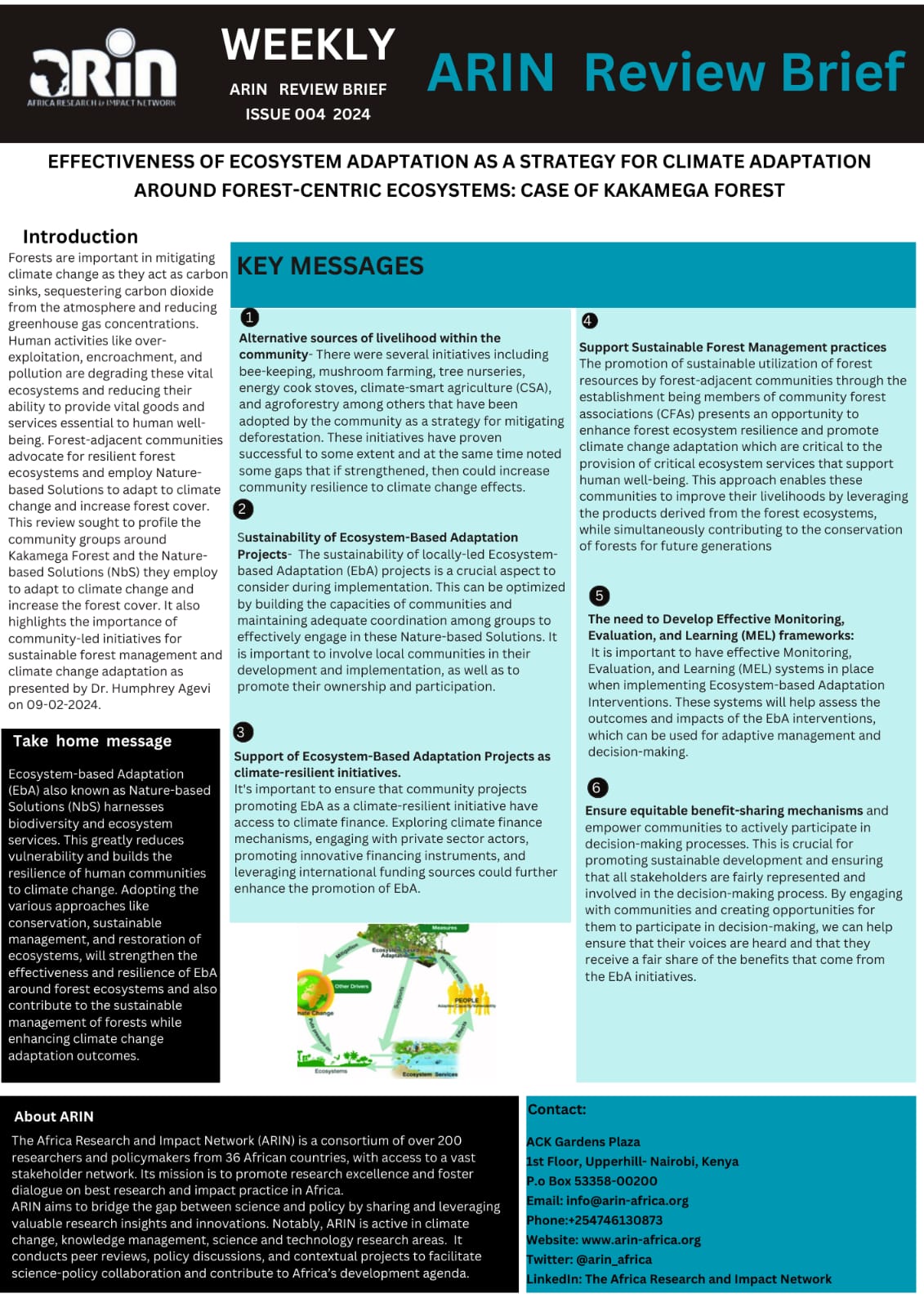Introduction.
Forests are important in mitigating climate change as they act as carbon sinks, sequestering carbon dioxide from the atmosphere and reducing greenhouse gas concentrations. Human activities like over-exploitation, encroachment, and pollution are degrading these vital ecosystems and are reducing their ability to provide vital goods and services essential to human well-being. Forest-adjacent communities advocate for resilient forest ecosystems and employ Nature-based solutions to adapt to climate change and increase forest cover. This review sought to profile the community groups around Kakamega Forest and the Nature-based Solutions (NbS) they employ to adapt to climate change and increase the forest cover. It also highlights the importance of community-led initiatives for sustainable forest management and climate change adaptation as presented by Dr. Humphrey Agevi on 09-02-2024.
Key Messages.
Alternative sources of livelihood within the community. There were several initiatives including bee-keeping, mushroom farming, tree nurseries, energy cook stoves, climate-smart agriculture (CSA), and agroforestry among others that have been adopted by the community as a strategy for mitigating deforestation. These initiatives have proven successful to some extent and at the same time noted some gaps that if strengthened, then could increase community resilience to climate change effects.
Sustainability of Ecosystem-Based Adaptation Projects. The sustainability of locally-led Ecosystem-based Adaptation (EbA) projects is a crucial aspect to consider during implementation. This can be optimized by building the capacities of communities and maintaining adequate coordination among groups to effectively engage in these Nature-based Solutions. It is important to involve local communities in their development and implementation, as well as to promote their ownership and participation.
Support of Ecosystem-Based Adaptation Projects as climate-resilient initiatives. It is important to ensure that community projects promoting EbA as a climate-resilient initiative have access to climate finance. Exploring climate finance mechanisms, engaging with private sector actors, promoting innovative financial instruments, and leveraging international funding sources could further enhance the promotion of EbA.
Support Sustainable Forest Management practices. The promotion of sustainable utilization of forest resources by forest-adjacent communities through the establishment being members of the community forest associations (CFAs) presents an opportunity to enhance forest ecosystem resilience and promote climate change adaptation which are critical to the provision of critical ecosystem services that support human well-being. This approach enables these communities to improve their livelihoods by leveraging the products derived from the forest ecosystems, while simultaneously contributing to the conservation of forests for future generations.
The need to Develop Effective Monitoring, Evaluation, and Learning (MEL) frameworks. It is important to have effective Monitoring, Evaluation, and Learning (MEL) systems in place when implementing Ecosystem-based Adaptation interventions. These systems will help assess the outcomes and impacts of the EbA interventions, which can be used for adaptive management and decision-making.
Ensure equitable benefit-sharing mechanisms and empower communities to actively participate in decision-making processes. This is crucial for promoting sustainable development and ensuring that all stakeholders are fairly represented and involved in the decision-making process. By engaging with the communities and creating opportunities for them to participate in decision-making, we can help ensure that their voices are heard and that they receive a fair share of the benefits that come from the EbA initiatives.
Conclusion
Ecosystem-based Adaptation (EbA) also known as Nature-based Solutions (NbS) harnesses biodiversity and ecosystem services. This greatly reduces vulnerability and builds the resilience of human communities to climate change. Adopting the various approaches like conservation, sustainable management, and restoration of ecosystems, will strengthen the effectiveness and resilience of EbA round forest ecosystems and also contribute to the sustainable management of forests while enhancing climate change adaptation outcomes.



